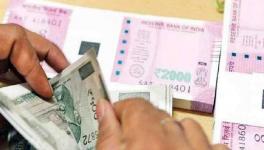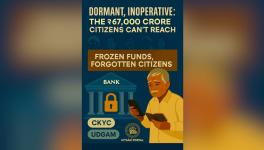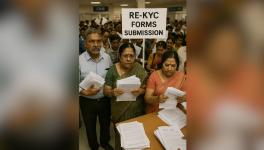New TN Government to Check ‘Leakages’, Explore Revenue Generation Amid Limited Resources
Since coming into power recently, the newly-elected Dravida Munnetra Kazhagam (DMK) government in Tamil Nadu has the herculean task of setting the state’s finances right. The finance minister has announced that the state will release a ‘white paper’ on the financial state of the state while raising concerns over liquidity.
The state debt was estimated at Rs 4,85,502 crore till March 31, 2021, as per the last interim budget presented by the All India Anna Dravida Munnetra Kazhagam (AIADMK) government. It is expected to rise beyond Rs 5,70,189 crore.
The state under the leadership of the AIADMK remained silent on unfulfilled promises by the Bharatiya Janata Party (BJP)-led Centre as per The Goods and Services Tax (GST) Act, resulting in increasing the burden on the state.
Issues of corruption have also been flagged, particularly the loss in revenue from excise duty of liquor sales, while the prospects of increasing revenue from mines and minerals are being explored by the new government.
‘WILL IDENTIFY LEAKAGES’
The newly-appointed finance minister PTR Palanivel Thiagarajan, a former banker, has said that his government will check leakage of revenue resulting in the shortfall. In an interview to The Hindu, he spoke in detail about the challenges the new government faces.
“I am going to find out where all these leakages are happening and fix it. Once we discover what the average income was as a percentage of GSDP from commercial tax, excise, mining, registration, stamps and different heads, the figures will be given to those departments as targets. They will be given as revenue targets to different Ministries. When was the last time this was done in Tamil Nadu?” he reportedly said in the interview.
He also alleged that the revenue deficit increased after 2014, prior to which the government used to get between 10% and 11% of GSDP as revenue.
“How much did we get from TASMAC (liquor sale), mines, commercial tax, professional tax and registration and stamp duty? You need to have tables for different heads. Then, we would know from where it came and understand what has gone wrong. My preliminary studies suggest that a whole chunk used to come from excise and that is now gone," he told the newspaper.
The finance minister has also said that the government would continue with the welfare measures as promised during the elections and would concentrate more on generating revenues, including from mines and minerals.
'STATES LOSE FREEDOM TO TAX'
Since the introduction of the GST regime the state governments are left with limited options to generate revenue through taxation.
Noted economist Prof. Venkatesh B. Athreya told Newsclick that “the states are left with the option to tax only four commodities: petrol, diesel, tobacco and alcohol. The earlier option of commodity tax no longer exists for the state”.
The different concessions given by the Centre is also weakening the finances of the state government, he said. “The union government has recently reduced the corporate tax due to which states end up as big losers,” he added. .
In addition, the Centre has resorted to levying cess and surcharges, which cannot be shared with the states. “The government has reduced the basic excise duty on diesel and petrol, but has increased the cess. Such moves have left the states in distress," Prof. Athreya said.
‘PANDEMIC INCREASING EXPENSES’
The Union Government has continued to insist that states adhere to the fiscal deficit limits, but the spending of the states has increased due to the COVID-19 pandemic.
“The states have been spending more on hospital infrastructure and other related expenses due to the pandemic,” Prof. Athreya said.
The cost of purchasing vaccines has come as an additional expense to the state governments with the Centre passing the buck. The BJP government has, however, not refrained from claiming credit for exporting vaccines to other countries before vaccinating their own citizens.
The DMK government has floated a global tender for procuring 3.5 crore doses of vaccines recently for the age group of between 18 and 44 years.
The Union Government has released Rs 8,873.6 crores, the Centre's share to the State Disaster Relief Fund (SDRF), of which the governments can spend 50% for COVID-19 containment measures.
A Reserve Bank of India (RBI) report indicated that the Gross Financial Deficit (GFD) of the states could double in 2020-21.
‘STATES MUST UNITE TO ASSERT RIGHTS’
The failure of the Centre in fulfilling the obligations under GST Act, including the payment of state GST compensation, has left the states gasping for funds during the pandemic.
“The Congress and non-BJP state governments must unite to raise such discrepancies of the Union Government. The states, including Tamil Nadu, must assert their rights and insist that the GST be revisited," Prof. Athreya added.
The leadership change in the state has increased the possibility of such moves, with the erstwhile AIADMK government remaining a mute spectator to the Centre's moves.
“Political mobilisation is highly important and the state governments must insist on the rights of the states. There is room for transfer of resources from the Government of India to states, which should be explored,” insisted Prof. Athreya.
With the finance minister himself hinting at corruption being a major issue and the state getting a lesser share from the Centre, the new government has its task cut out in setting the finances right.
Get the latest reports & analysis with people's perspective on Protests, movements & deep analytical videos, discussions of the current affairs in your Telegram app. Subscribe to NewsClick's Telegram channel & get Real-Time updates on stories, as they get published on our website.
























